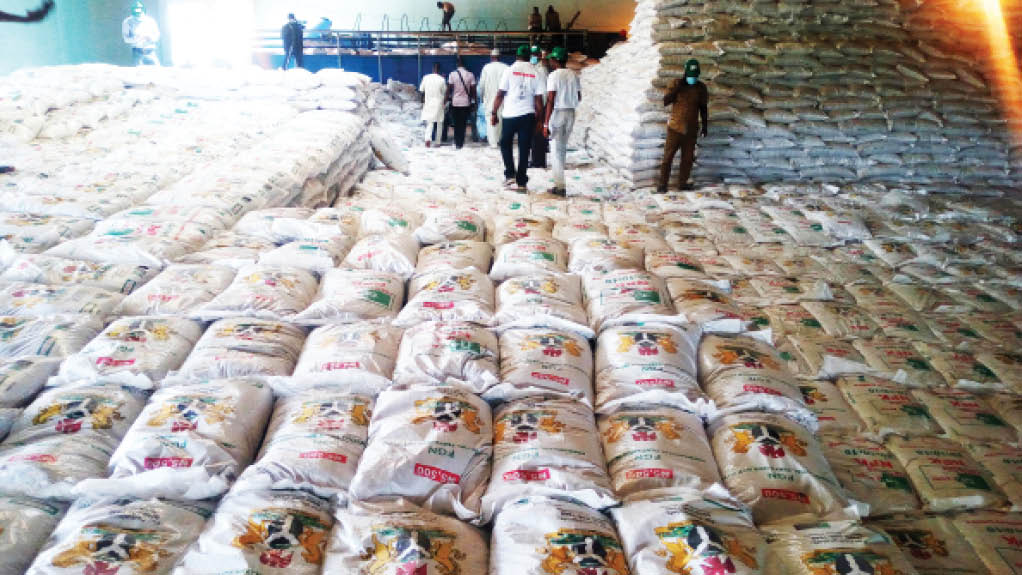Address soaring fertiliser prices as national emergency
Following the soaring prices of fertiliser in Nigeria, there are fears among stakeholders in the agricultural sector of a looming food crisis in the country. The hike in prices would deny many farmers access to this critical input needed to boost the fertility of their farmlands. The lack or non-application of fertiliser by farmers for […]

Hussein Yahaya, Vincent A Yusuf & Ibrahim Musa Giginyu, Kano
Following the soaring prices of fertiliser in Nigeria, there are fears among stakeholders in the agricultural sector of a looming food crisis in the country. The hike in prices would deny many farmers access to this critical input needed to boost the fertility of their farmlands. The lack or non-application of fertiliser by farmers for any reason has been a major cause of low yields over the years. Stakeholders are expressing worry that the situation, if not addressed, will affect this year’s wet season farming and the eventual harvest.
Already, the surging prices have affected yields from dry season farming. A farmer in Funtua, Katsina State, said the high cost of fertilisers was one of the reasons many irrigation farmers cultivated wheat during this year’s dry season farming instead of tomatoes and Irish potatoes, which require a lot of fertiliser for better and bumper harvest.
- Suspected female ritualist nabbed with school uniform, money, books in Kwara
- Chinese in Nigeria now into smuggling of contraband — Customs
President of the All Farmers’ Association of Nigeria (AFAN), Arc Kabiru Ibrahim, confirmed farmers’ worries over high prices of fertiliser, and noted that it would affect the upcoming wet farming season. “Last year, because the Presidential Fertiliser Initiative (PFI) did not give the usual subsidy to supply 20:10:10 at N5, 500, farmers could not afford the commodity,” he said.
Reports in the media indicate that since the beginning of the 2021/2022 dry season farming, the prices of fertiliser, especially Urea and NPK, have risen beyond the reach of many peasant farmers. A market survey revealed that the price of urea had moved from N11,000 to N18,000, while NPK has moved from N10,000 to N16,000 even though the prices vary from one city or town to another.
Similarly, there are concerns among farmers that the invasion of Ukraine by Russia may affect the local production of fertiliser in the country which could further push its price up. The Kaduna State Chairman of the Maize Growers, Processors and Marketers Association of Nigeria (MAGPAMAN), Lawal Maishanu, expressed concern that this year could be disastrous for farmers if government fails to intervene fast. “Between 37 and 45 per cent of the chemical used in the production of urea fertiliser comes from Ukraine while Morocco provides about 35 per cent of the chemicals. We fear that if the war in Ukraine spreads, things will be bad,” he said. Others, however, opine that the prices of fertiliser started surging even before the war in Ukraine.
The Presidential Fertiliser Initiative (PFI), after its creation, did not only revamp moribund fertiliser blending plants across the country but further brought down the hitherto high prices of the input. As at 2021, the Nigeria Sovereign Investment Authority (NSIA) said the number of fertiliser blending plants working in Nigeria had risen to 47. President Muhammadu Buhari established the PFI to specifically address the shortfall in fertiliser needs of Nigerian farmers. The resuscitation of fertiliser blending companies led to the mass production of fertiliser at subsidized prices. Through PFI’s mandate, blending companies reportedly produced about 30 million bags of fertiliser during the four years of its active operation when NPK fertiliser sold at N5,500/50kg bag in most parts of the country. However, farmers said the arrangement did not work last year as the fertilisers were not available to farmers at government’s subsidised rate.
The consequences of food crisis are multi-faceted and no less devastating than the huge cost of a full-blown war. Besides malnutrition and hunger, food insecurity is a recipe for several humanitarian crises. The most vulnerable are children, mothers and the elderly. While mothers have less energy to take care of their toddlers, children suffer malnutrition and stay away from school most of the time.
Food crisis could also give rise to inflation because of demand and supply forces. Disease, migration-related disasters, trade imbalances, commodity hoarding and political instability are other remote consequences of food insecurity. With the other forms of insecurity bedevilling the country, Nigeria cannot afford to add food insecurity to its current challenges. Everything must be done to forestall the imminent food crisis.
To avert the effects of the war in Ukraine on fertiliser production in Nigeria, we advise the federal government to strengthen existing agreements with Morocco in order to sustain and increase the importation of necessary processing chemicals into the country. As a national emergency, Daily Trust further calls on the federal government to immediately revive the PFI and make it function in the same way it made fertiliser available and affordable in the past. The creation by government of a friendly tax regime for existing fertiliser blending companies would be part of the enabling environment needed to sustain private sector participation and optimal operation. While the federal government through the PFI is urged to increase access of farmers through cooperative societies to credit facilities that would empower them to afford fertiliser and other farm inputs, state governments are also encouraged to subsidize fertiliser especially to peasant farmers.
